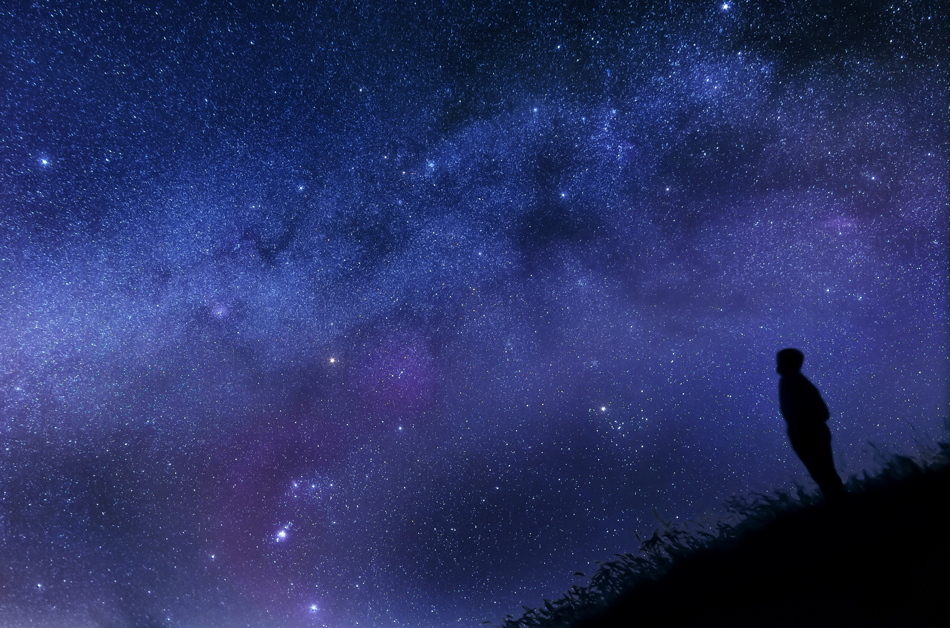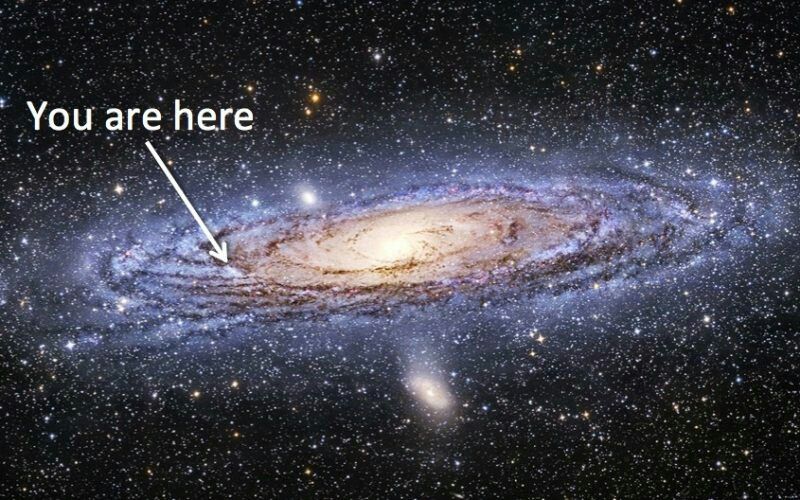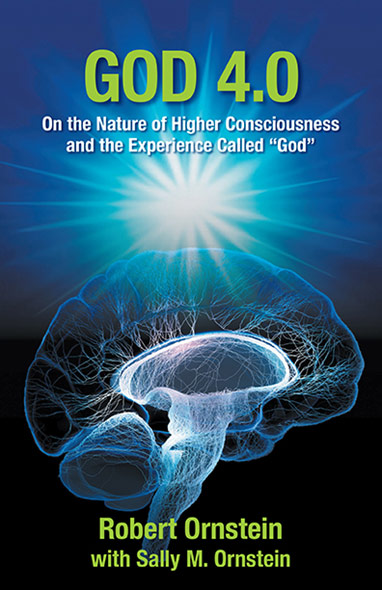
Looking Up, Looking Out
David S. Sobel, MD | February 8, 2023
I recently saw some amazing photos of our galaxy, and some galaxies beyond, taken from the NASA Hubble Space Telescope orbiting the Earth. I was stunned. It even inspired me to go outside and gaze at the stars at night. Of course, the hazy interference of the earth’s atmosphere coupled with urban light pollution, made what I saw not quite as dramatic as the Hubble images.
What I realized is that I don’t look up often. Most of the time, I am looking down—at a book, a phone screen, tablet, or computer. Just observe people at an airport or even walking down the street. We have become a species of bowed heads, not as a posture of prayer or humility, but of worshipping screens. I’m sure our ancestors spent more time examining the skies and heavens—looking for guidance, perspective or just what was coming next in the weather.
I discovered a related antidote to everyday stress: it’s a photo of our galaxy with a tiny arrow pointing to one tiny speck of light immersed in a thousand stars. It has a caption that says, “You are here. “

This image provokes me to consider how small and insignificant my daily concerns are in the total scheme of the universe. Whether I like to admit it or not, I spend most of my time focusing on a rather small world, notably one which has me as the center of its universe. What am I going to eat? Where should I park? Do people like me? What’s in it for me? and on and on. Feeling insignificant in the face of an awesome universe, even for a moment, can recalibrate us for the better.
For example, looking towards the heavens during an awe-inspiring celestial event like a total solar eclipse can apparently trigger less self-focus and even alter our Twitter entries. A study published in the journal Psychological Science reports that eclipsers (people who watch eclipses) used the words “I,” “me” and “mine” less, and more words like “we,” “our,” and “us” more. The researchers concluded: “We found that the eclipse inspired awe among people in its path of totality and, in turn, increased humility, collective focus, affiliation, and pro-sociality—tendencies that enable people to form into collaborative social groups.”
The value of looking up and outward may be rooted in how the human brain evolved. As neuropsychologist Robert Ornstein, and Sally Ornstein, observed in the book God 4.0: On the Nature of Higher Consciousness and the Experience Called “God”:
There is considerable evidence to indicate that human beings, more than other animals, have evolved the ability to see well beyond the self and, in the process, to take a longer view and connect at a deeper level with others. It’s likely that these changes were precipitated by our shift from moving around on all fours to standing and walking on two feet. We could then routinely look outward or upward, rather than just straight ahead at a low level or downward, and this enabled a huge change in perspective. It formed a basis, in due course, for a more encompassing awareness that extended beyond the immediate locale.
Looking upwards and outward can make us feel both smaller and yet, more connected. Yes, I am but one tiny being on a tiny planet, but I am part of the whole human journey, and that planet is part of a larger system.
So how else might we enlarge and connect to a larger world view besides looking at the stars? Well, certainly traveling the world can enlarge our view, but it can be expensive and time-consuming. I have found another way that works: I can take a quick look at human history and the diversity of our planet by scrolling through the topics on The Human Journey website. Within seconds, and from the convenience of my own home, I can read about important watersheds in the long story of the evolution of the human mind; from fascinating in-depth writeups about our early origins to how we can bring about a more connected and sustainable future for all. Just viewing a few of the entries on the website stretches my small world and invites me to look well beyond myself.
David S. Sobel, MD, is an Adjunct Lecturer in the Department of Medicine at the Stanford University School of Medicine. He is coauthor of ten books including three with Robert Ornstein, entitled The Healing Brain, Healthy Pleasures, and The Mind & Body Health Handbook.
Recent Blogs
- Style-Shifting: Why We Speak Differently Around Friends
- Can We Make More Accurate Predictions In Economics?
- Our Subpersonalities and Many-Sided Selves
- The Illusion of Predictability in Economics
- An Old Story About Metaphysics
- The Conditioning Machines in Our Back Pockets
- Out on a Limb: The Danger of our Innate Shortsightedness
- Edward T. Hall: Culture Below the Radar
- The Half Brain Method
- 'He Who Tastes Knows': Contemporary Sufi Studies and the work of Idries Shah
- "They Saw a Game"
- A Funny Thing Happened on the Way to Enlightenment
- Finding the Right Way Home
- Time and Self
- Escaping the Either/Or Thinking Trap
- Looking Up, Looking Out
- Conditioning and the Gendered Brain
- New World, Same Mind?
- One Small Word
- Meaning: The Enduring Gift to Spirit
- Beyond East and West: Human Nature and World Politics
- Forest Smarts: A Part of or Apart From?
- How to Improve Group Decision-Making
- We Know More Than We Think We Do
- How Deep Can a Story Go?
- Lost and Found: An Encounter with the Intuitive Mind
- The Devil’s Tuning Fork
- Welcome to The Human Journey Blog

